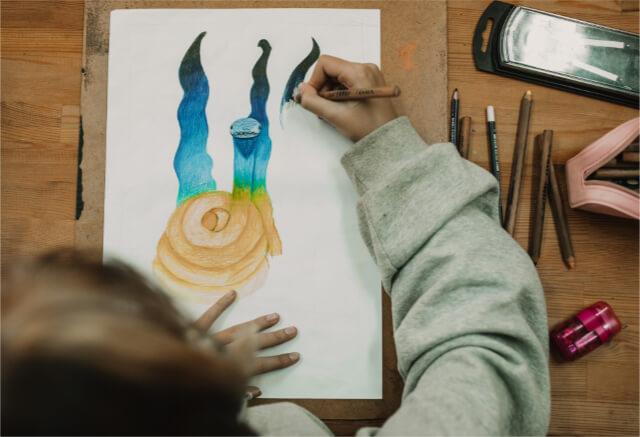
The healthy rhythms of the school day that have accompanied them from an early age are maintained in the upper grades, although great inner changes accompany the visible physical and physiological changes. The growing sense of physical power and the effervescence of burgeoning sexuality are joined by a growing quest for independence. The young man or woman moves away not only from the certainties provided by his family environment, but also from everything he has previously learned. Everything will be passed through the filter of his newborn critical faculty.
To accompany all these changes, the curriculum introduces activities that are increasingly oriented towards the outside world, such as carpentry, surveying, forestry, practical projects that can be individual or in groups and that teenagers want to do.
A day in a secondary school classroom
8:10 h.
The teacher greets the pupils by shaking hands/ bumping elbows, looking them in the eye and asking them how they feel that morning. This first gesture creates an atmosphere of connection and trust between the teacher and the pupils.
In the classroom they recite the poem “I look at the world…” which predisposes them to observe and understand the world around them.
The rhythmic part of secondary school is accompanied by precise and age-appropriate activities, developing strength and dexterity, as well as cunning and teamwork. Rhythmic is finished with artistic activities such as singing, reciting or playing the recorder.
The rest of the main lesson is developed incorporating, depending on the course, the curricular contents (chemistry, mathematics and geometry, physics, natural sciences, history, geography and astronomy or language) helping to enhance the critical sense and beauty in the works and notebooks that the youngsters will prepare.
11:00 h.
At the first snack time, pupils eat their food, which they are grateful for in an atmosphere of tranquillity and full awareness. Then they go outside where they begin a time of expansion to practice sports, play and socialise
11:30 h.
The specialities block begins: music, carving, modelling and drawing… These subjects contribute to fine motor skills and complement the brain development of the pupils. The work in these subjects is related to the academic content of the main class. English and Valencian are also taught in this block. In the subject of ethics, through biographies of historical figures or events, pupils are introduced to the development of values and a critical sense of life.
13:00 h.
The second snack coincides with lunchtime. A time to regain strength and go outside briefly with classmates to clear the mind and face the last part of the morning with strength.
13:30-15:00 h.
The time for specialities continues, which normally coincides with a more physical subject such as movement education, crafts and horticulture. These subjects relate almost directly to the content taught in the main class. The day ends with a farewell poem that the teacher chooses for the class evoking the farewell, and the love and care for what has been learned.








